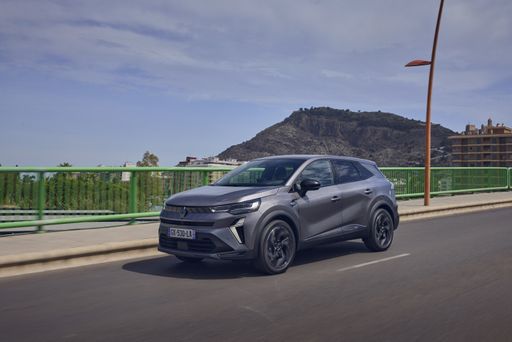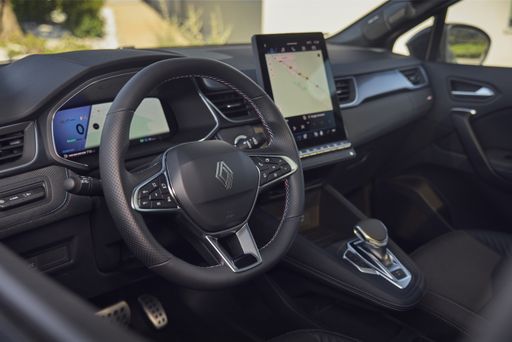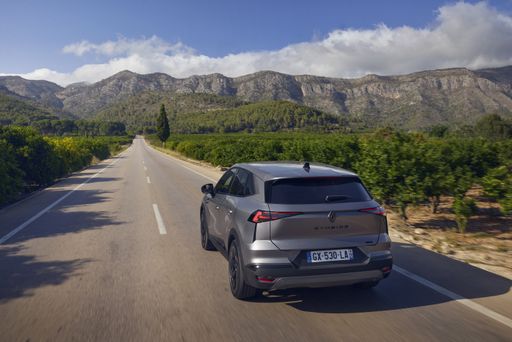Hyundai Bayon vs Renault Symbioz - Differences and prices compared
Costs and Efficiency:
Looking at overall running costs, both models reveal some interesting differences in everyday economy.
Hyundai Bayon has a clearly perceptible advantage in terms of price – it starts at 20100 £, while the Renault Symbioz costs 24400 £. That’s a price difference of around 4371 £.
Fuel consumption also shows a difference: Renault Symbioz manages with 4.50 L and is therefore noticeable more efficient than the Hyundai Bayon with 5.40 L. The difference is about 0.90 L per 100 km.
Engine and Performance:
Power, torque and acceleration are the classic benchmarks for car enthusiasts – and here, some clear differences start to show.
When it comes to engine power, the Renault Symbioz has a clearly perceptible edge – offering 158 HP compared to 100 HP. That’s roughly 58 HP more horsepower.
In acceleration from 0 to 100 km/h, the Renault Symbioz is evident quicker – completing the sprint in 9.10 s, while the Hyundai Bayon takes 11.30 s. That’s about 2.20 s faster.
In terms of top speed, the Renault Symbioz performs minimal better – reaching 180 km/h, while the Hyundai Bayon tops out at 179 km/h. The difference is around 1 km/h.
There’s also a difference in torque: Renault Symbioz pulls clearly perceptible stronger with 265 Nm compared to 200 Nm. That’s about 65 Nm difference.
Space and Everyday Use:
Whether family car or daily driver – which one offers more room, flexibility and comfort?
Seats: offers more seating capacity – vs .
In curb weight, Hyundai Bayon is to a small extent lighter – 1170 kg compared to 1359 kg. The difference is around 189 kg.
In terms of boot space, the Renault Symbioz offers clearly perceptible more room – 576 L compared to 411 L. That’s a difference of about 165 L.
In maximum load capacity, the Renault Symbioz performs evident better – up to 1682 L, which is about 477 L more than the Hyundai Bayon.
When it comes to payload, Hyundai Bayon slight takes the win – 465 kg compared to 459 kg. That’s a difference of about 6 kg.
Who wins the race?
The Renault Symbioz proves to be is largely superior and therefore becomes our DriveDuel Champion!
Renault Symbioz is the better all-rounder in this comparison.
 @ Renault Group Media
@ Renault Group Media
Renault Symbioz
Costs and Consumption
View detailed analysis
Engine and Performance
View detailed analysis
Dimensions and Body
View detailed analysis
Hyundai Bayon
The Hyundai Bayon slips neatly between city runabout and small SUV, offering surprising practicality and a fresh, confident design that stands out in urban traffic. It's an easy buy for shoppers who want smart packaging, tidy handling and a dash of personality without fuss — a sensible little crossover that makes everyday driving a bit more enjoyable.
details @ Hyundai Motor Company
@ Hyundai Motor Company
 @ Hyundai Motor Company
@ Hyundai Motor Company
 @ Hyundai Motor Company
@ Hyundai Motor Company
 @ Hyundai Motor Company
@ Hyundai Motor Company
 @ Hyundai Motor Company
@ Hyundai Motor Company
Renault Symbioz
The Renault Symbioz feels less like a traditional car and more like a rolling living room that's been told it's allowed to drive — its flowing lines and minimalist cabin are pure concept-car theatre that teases the future of everyday transport. For buyers with an eye for design and a taste for tech-forward ideas, the Symbioz is an alluring vision of what Renault could offer tomorrow, even if it's not yet a model you can park in your driveway.
details @ Renault Group Media
@ Renault Group Media
 @ Renault Group Media
@ Renault Group Media
 @ Renault Group Media
@ Renault Group Media
 @ Hyundai Motor Company
@ Hyundai Motor Company
|
 @ Renault Group Media
@ Renault Group Media
|
|
|
|
Costs and Consumption |
|
|---|---|
|
Price
20100 - 25800 £
|
Price
24400 - 30700 £
|
|
Consumption L/100km
5.4 - 5.5 L
|
Consumption L/100km
4.5 - 6 L
|
|
Consumption kWh/100km
-
|
Consumption kWh/100km
-
|
|
Electric Range
-
|
Electric Range
-
|
|
Battery Capacity
-
|
Battery Capacity
-
|
|
co2
124 g/km
|
co2
102 - 136 g/km
|
|
Fuel tank capacity
40 L
|
Fuel tank capacity
48 L
|
Dimensions and Body |
|
|---|---|
|
Body Type
SUV
|
Body Type
SUV
|
|
Seats
5
|
Seats
5
|
|
Doors
5
|
Doors
5
|
|
Curb weight
1170 - 1195 kg
|
Curb weight
1359 - 1544 kg
|
|
Trunk capacity
411 L
|
Trunk capacity
492 - 576 L
|
|
Length
4180 mm
|
Length
4413 mm
|
|
Width
1775 mm
|
Width
1797 mm
|
|
Height
1500 mm
|
Height
1575 mm
|
|
Max trunk capacity
1205 L
|
Max trunk capacity
1582 - 1682 L
|
|
Payload
460 - 465 kg
|
Payload
376 - 459 kg
|
Engine and Performance |
|
|---|---|
|
Engine Type
Petrol
|
Engine Type
Full Hybrid, Petrol MHEV
|
|
Transmission
Manuel, Automatic
|
Transmission
Automatic, Manuel
|
|
Transmission Detail
Manual Gearbox, Dual-Clutch Automatic
|
Transmission Detail
Automatic Gearbox, Manual Gearbox, Dual-Clutch Automatic
|
|
Drive Type
Front-Wheel Drive
|
Drive Type
Front-Wheel Drive
|
|
Power HP
100 HP
|
Power HP
140 - 158 HP
|
|
Acceleration 0-100km/h
11.3 - 12.4 s
|
Acceleration 0-100km/h
9.1 - 11 s
|
|
Max Speed
176 - 179 km/h
|
Max Speed
180 km/h
|
|
Torque
172 - 200 Nm
|
Torque
250 - 265 Nm
|
|
Number of Cylinders
3
|
Number of Cylinders
4
|
|
Power kW
74 kW
|
Power kW
103 - 116 kW
|
|
Engine capacity
998 cm3
|
Engine capacity
1332 - 1789 cm3
|
General |
|
|---|---|
|
Model Year
2024
|
Model Year
2025
|
|
CO2 Efficiency Class
D
|
CO2 Efficiency Class
C, D, E
|
|
Brand
Hyundai
|
Brand
Renault
|
What drivetrain options does the Hyundai Bayon have?
The Hyundai Bayon is available as Front-Wheel Drive.
The prices and data displayed are estimates based on German list prices and may vary by country. This information is not legally binding.
